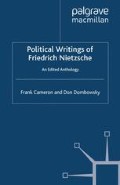Abstract
Bismarck would begin to relax the Kulturkampf laws in 1878, with Nietzsche prophesying the consignment of the Catholic Church to ‘the shadows of oblivion’.1 In Human, All Too Human, two volumes of aphorisms published in 1878 and 1879 and dedicated to Voltaire, Nietzsche alters his philosophical orientation by writing as a rationalist promoting the ideals of the Enlightenment. This new Nietzsche is anti-nationalist and cosmopolitan, projecting a ‘universal world culture’ under the ‘guidance and guardi-anship’ of the ‘good Europeans’, whose task will be to ‘work actively on the merging of nations’ in order to produce ‘the strongest possible mixed European race’, including the Jews.2 Human, All Too Human was written in 1876 ‘in the midst of the Bayreuther Festspiele’, at a time when his friendship with Wagner was drawing to a dramatic conclusion due to the composer’s anti-Semitism, Christianity and commitment to German cultural national-ism. Moreover, Nietzsche no longer greeted Wagner’s programme of cultural renewal, with which he had allied himself in the early 1870s, with the same enthusiasm. The Bayreuth Festival had dispelled any hope for a revitalisation of the Dionysian spirit.
Access this chapter
Tax calculation will be finalised at checkout
Purchases are for personal use only
Preview
Unable to display preview. Download preview PDF.
Notes
As Bergmann observes. Peter Bergmann, Nietzsche, ‘the Last Antipolitical German’ (Bloomington, IN: Indiana University Press, 1987), p. 121.
Whether or not Nietzsche supported the anti-Socialist Laws is difficult to deter-mine unequivocally. The only passage which explicitly refers to the ‘exceptional rules’ that have made ‘enemies’ — although ‘welcome enemies’ — of the socialist movement, and which thus sheds some light on Nietzsche’s perception of these ‘rules’, is MM 316: ‘The socialistic movements are today becoming more and more agreeable than terrifying to the dynastic governments, because by these movements they are provided with a right and a weapon for making exceptional rules, and can thus attack the figures that really fill them with terror, the democrats and anti-dynasts. — Towards all that such governments professedly detest they feel a secret cordiality and inclination …’ Nietzsche’s position is that dynastic governments (by which he means the Bismarckian/Wilhelmian Reich) introduced the anti-Socialist Laws (‘exceptional rules’) primarily to target the ‘democrats and anti-dynasts’ (by which he means the National Liberal and Progressive Liberal parties). This passage reveals that Nietzsche believed that Bismarck’s measures were not really designed to undermine the power of the socialists, but of the liberals. Nietzsche’s perception was partially correct as Bismarck’s conservative goals required the weakening, or splitting, of the liberals in the Reichstag which debate over these Laws effectively achieved. Nevertheless, Nietzsche is wholly accurate in identifying a technique of political rule typically utilised by Bismarck, that is, governing through raising the threat of common enemies, yet Nietzsche appears to be grossly underestimating Bismarck’s actual view of the socialists as a serious political threat to the Reich. Certainly, Nietzsche would have been aware of the extensive persecution of the socialist movement, the closing of their presses, the deportation and imprisonment of their leaders; these were not acts that betrayed a ‘secret cordiality’. The question is: is Nietzsche supporting the democrats in this passage or is he suggesting that the government should have gone further and outlawed the socialist party completely (as the Laws permitted the parliamentary caucus of the SPD to continue to operate in the Reichstag)? The beginning of an answer may be found in Curtis Cate’s remark that Nietzsche ‘felt misgivings about the concessions the German Chancellor seemed prepared to make in not ruthlessly outlawing all communist and socialist movements’. See Curtis Cate, Friedrich Nietzsche: A Biography (London: Pimlico, 2003), p. 273.
Author information
Authors and Affiliations
Copyright information
© 2008 Frank Cameron and Don Dombowsky
About this chapter
Cite this chapter
Cameron, F., Dombowsky, D. (2008). The Free Spirit, 1878–1880. In: Political Writings of Friedrich Nietzsche. Palgrave Macmillan, London. https://doi.org/10.1057/9780230371668_4
Download citation
DOI: https://doi.org/10.1057/9780230371668_4
Publisher Name: Palgrave Macmillan, London
Print ISBN: 978-0-230-53773-6
Online ISBN: 978-0-230-37166-8
eBook Packages: Palgrave Religion & Philosophy CollectionPhilosophy and Religion (R0)

